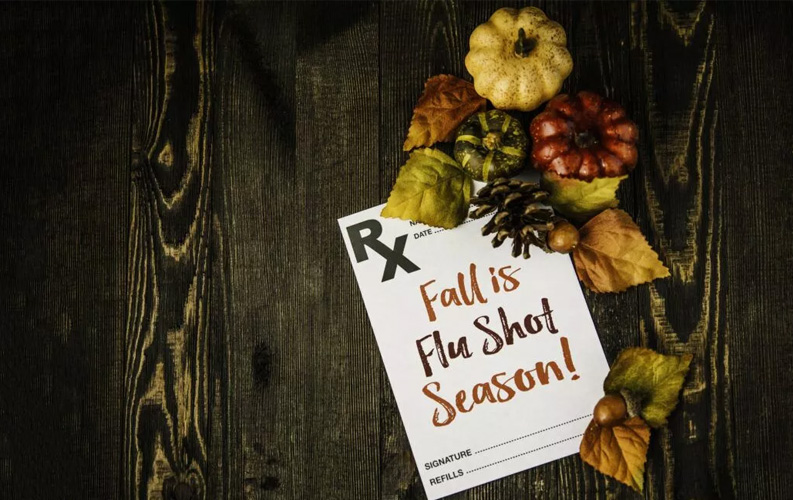
Is the Flu Shot Also a Vaccine Against Alzheimer’s Disease?
If you haven’t gotten your annual flu shot yet, here’s powerful motivation to do so: A new study of nearly 2 million older adults has linked influenza vaccination to a 40 percent drop in risk for developing Alzheimer’s disease (AD), the most common form of dementia. Other studies report that flu shots, as well as the pneumonia vaccine, may also help protect against heart attacks, strokes and death from cardiovascular causes.
Here’s a closer look at these potentially lifesaving discoveries, who should get these shots, and why they may help safeguard heart health and memory while also lowering your risk for debilitating or potentially lethal infections.
What did the researchers learn about Alzheimer’s risk and flu shots?
In a study published in Journal of Alzheimer’s Disease in August, 2022, a team from University of Texas Health Sciences Center in Houston used records from a large medical claims database to analyze rates of AD in patients with and without prior flu vaccination. Using a “lookback period” of six years, the team identified 935,887 flu-vaccinated patients.
The group of vaccinated patients was matched with 935,887 unvaccinated patients who had similar baseline demographics, medication use and medical conditions. Patients in both groups were initially free of dementia and were over age 65 at the start of the study. Over the next four years, the team tracked the rates of AD in both groups.
During the follow-up period, 5.1 percent of the vaccinated patients and 8.5 percent of the unvaccinated group developed AD. That meant the rate of the memory-robbing disorder was 40 percent lower in those who had received at least one flu vaccine during the lookback period.
How do the findings compare with those from earlier studies?
A study presented at the Alzheimer’s Association International Conference (AAIC) in July 2020 looked at links between annual flu shots and risk for AD in a propensity-matched set of 9,066 patients ages 60 and older. Key findings from the study by Albert Amran, a medical student at McGovern Medical School at The University of Texas Health Science Center at Houston, and a team of researchers include the following:
- Having at least one flu shot was associated with a 17 percent reduced risk for Alzheimer’s disease.
- People who consistently got annual flu shots had 30 percent lower risk for AD.
- The protective effects of flu shots were strongest in those who received their first flu shot at a younger age. For example, those who got their first documented flu shot at age 60 benefitted more than those who waited until age 70 to get their first flu shot.
“Our study suggests that regular use of a very accessible and relatively cheap intervention — the flu shot — may significantly reduce risk of Alzheimer’s dementia,” Amran stated in a news release from the Alzheimer’s Association. The CDC recommends the annual influenza vaccination for everyone ages six months or older but cautions that certain people should check with their healthcare provider before being immunized.
How do pneumonia shots affect risk for Alzheimer’s disease?
Another study presented at the same conference found that vaccination against pneumococcal pneumonia reduced older adults’ risk for AD by up to 40 percent, depending on their individual genetic profile. The study was conducted by Svetlana Ukraintseva, PhD, of Duke University and colleagues.
The team examined links between AD and pneumococcal pneumonia vaccination, with or without an accompanying seasonal influenza shot, in more than 5,100 men and women ages 65 and older who were participating in the Cardiovascular Health Study. The results were adjusted for age, race, birth cohort, education and smoking. The researchers also took into account a strong genetic risk factor for AD: carrying a variant called the G allele of rs2075650 in the TOMM40 gene.
Dr. Ukraintseva’s study also reported that people who received a higher number of flu and pneumonia vaccinations between ages 65 and 75 had a 12 percent lower risk for AD as compared to people who received fewer or no shots.
How might genes influence rates of Alzheimer’s disease in people who get pneumonia shots?
“[This genetic variant is] linked to [the] NECTIN2 gene, which is involved in blood-brain barrier permeability and vulnerability to infection,” Dr. Ukraintseva told Medpage today. Overall, in the entire group, those who were vaccinated against pneumonia between ages 65 and 75 had 30 percent lower risk for AD afterwards.
However, among noncarriers of the G allele of rs2075650, risk for AD dropped by 38 percent, the study found. “This means that adult vaccination against pneumonia may reduce Alzheimer’s risk depending on individual genotype, which supports personalized prevention of Alzheimer’s disease,” Dr. Ukraintseva said.
Who should get the pneumonia vaccine?
The CDC and the BaleDoneen Method recommend the shot for everyone ages 65 and older, as well as younger people with risk factors for pneumonia, such as heart failure, pulmonary disease, diabetes or smoking. The shot protects against infection by 23 types of pneumococcal bacteria and has been FDA-approved since 2000. Rates of the types of pneumonia the shot protects against have dropped by 99 percent in the U.S. since it was introduced, the CDC reports. However, pneumonia remains a major public threat — particularly to those who are NOT vaccinated — killing about 50,000 Americans a year, most of whom are over 65 or older.
Along with protecting against a dangerous infection — and the risk of being hospitalized with pneumonia during the COVID-19 pandemic — the pneumococcal immunization also another life-saving benefit: A study of more than 84,000 people found that those who have been vaccinated against this disease were at lower risk for heart attack and stroke. Given these benefits, we recommend being vaccinated at age 50 if you have cardiovascular disease.
Do seasonal flu shots help prevent heart attacks and strokes?
Adults who are immunized have a 46% lower risk for fatal or nonfatal heart attacks, strokes and other major cardiovascular (CV) events over the subsequent 12 months, compared to those who received a placebo shot or no shot, according to a recent Harvard analysis that pooled results from randomized clinical trials involving nearly 7,000 men and women.
Another recent study found that people who are vaccinated early in the flu season (such as September or October) have a greater reduction in heart attack risk than those who wait until mid-November to be immunized. Many studies have shown that acute influenza infection is a strong, independent risk factor for heart attacks and strokes. Researchers report that up to 91,000 Americans die each year from CV events triggered by flu. These grim statistics have prompted the American Heart Association and the American College of Cardiology to issue guidelines recommending flu shots for people with cardiovascular disease (CVD).
Why would flu and pneumonia shots have any effect on risk for Alzheimer’s disease?
“The fact that very different pathogens — viral, bacterial, fungal — have been linked to Alzheimer’s disease suggests a possibility that a compromised host immunity may play a role in Alzheimer’s through increased overall brain’s vulnerability to microbes,” Dr. Ukraintseva said. “Some vaccines show beneficial off-target effects on health that span beyond the protection against specific disease,” she told MedPage Today. “This could be because they may improve immunity on a broad scale.”
Another possibility is that by protecting against flu and pneumonia, these vaccines help people avoid the systemic inflammation that these diseases cause. As we recently reported, targeting brain inflammation is one of the newest strategies to prevent AD and other forms of dementia. Recently, 24 of the world’s leading experts on dementia prevention published a landmark paper in Lancet outlining lifestyle steps that could reduce risk for memory loss by up to 35 percent. These steps were designed to reduce brain inflammation and other factors that can set the stage for dementia.
Although vaccinations were not discussed in that paper, these new findings suggest yet another powerful reason to get your annual flu shot in September. Doing so could save your life, heart and brain! And if you are 65 or younger with risk factors for pneumonia, getting that vaccine could also be one of the easiest — and fastest — ways to protect your memory, your lungs and your arteries!
